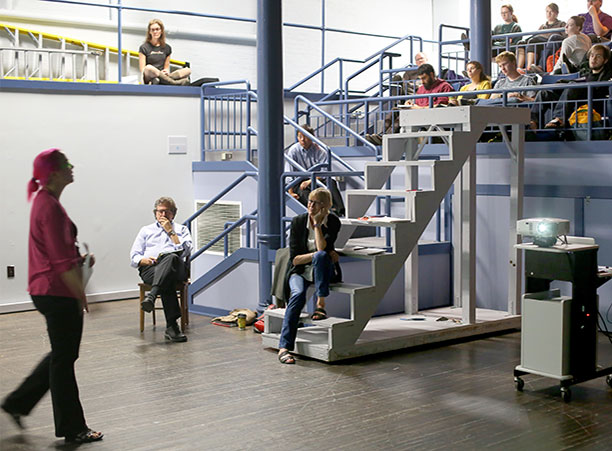 In the February issue of Connections, an online publications of the Association of Jesuit Colleges and Universities, Leah Hager Cohen, distinguished writer-in-residence in the English department at the College of the Holy Cross, and Lynn Kremer, professor of theatre at the College of the Holy Cross, write about CreateLab, an experimental course on creativity taught by a team of faculty from diverse disciplines.
In the February issue of Connections, an online publications of the Association of Jesuit Colleges and Universities, Leah Hager Cohen, distinguished writer-in-residence in the English department at the College of the Holy Cross, and Lynn Kremer, professor of theatre at the College of the Holy Cross, write about CreateLab, an experimental course on creativity taught by a team of faculty from diverse disciplines.
“CreateLab was devised in conjunction with a new initiative, Arts Transcending Borders (ATB), which aspires to transform the culture and identity of Holy Cross by bringing creativity through the arts into the entire curriculum and co-curriculum.” Cohen and Kremer explain.
“Twice a week, the entire CreateLab community, including ATB guest artists, gather for an hour and fifty minutes. Professors take turns presenting mini-lectures (individually or jointly); leading discussions on readings and other assigned material; and issuing micro-challenges and engaging students in hands-on experimentation with creative prompts and projects. Each group also collaborates on two major projects over the course of the semester: these may include elements of live performance, video, installation art, the design of business plans for apps or games, tableaux vivant, etc.”
However, during the first midterm evaluation, not only did the professors find themselves at odds with one another, but with the students as well over the critiques of the projects.
“Collectively, we examined our own feelings about what had occurred, acknowledged where gaps in communication had led to misunderstandings about assessment practices, and discussed the students’ reactions in terms of their honesty and agency – especially within a culture that tends to prize obeisance and deference. How wonderful, we realized! After several weeks of dutifully trying to please us, the instructors, they had become invested enough in the course to push back and assert their own ideas about how they could best benefit their growth,” says Cohen and Kremer.
As the radical new class came to an end in December, Cohen and Kremer saw changes in both the students’ work and the passion for such work that they credit to the process of creating.
“What really stood out was the way that several groups drew together during the process of creating their final collaborations, often overcoming subtle or overt degrees of adversity, timidity and factionalism they’d struggled with earlier – and the way that groups presented work the students themselves were passionate about, rather than work they thought would please the professors/graders. In the end, everyone who’d staked a claim in the course, faculty and students alike, had a hand in shaping it – and an opportunity to be provoked, nourished and changed.”
This “Holy Cross in the News” item by Jacqueline Smith.